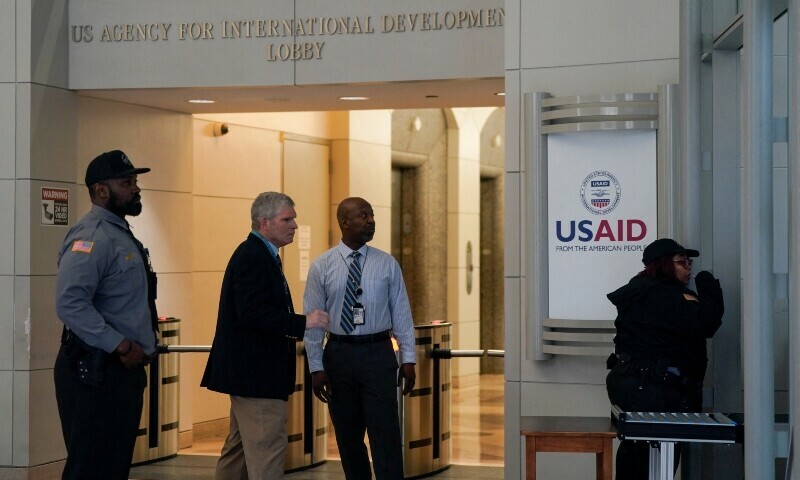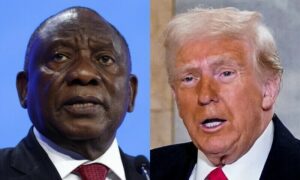A US judge on Friday temporarily allowed roughly 2,700 US Agency for International Development (USAID) employees put on leave by President Donald Trump’s administration to go back to work, pausing aspects of a plan to dismantle the agency.
US District Judge Carl Nichols in Washington, who was nominated by Trump during his first term, partially granted a request from the largest US government workers’ union and an association of foreign service workers who sued to stop the administration’s efforts to close the agency.
Nichols’s order, which will be in effect until February 14, blocks the Trump administration from implementing plans to place about 2,200 USAID workers on paid leave beginning on Saturday and reinstates some 500 employees who had already been furloughed.
It also bars the administration from relocating USAID humanitarian workers stationed outside the United States.
Nichols will consider a request for a longer-term pause at a hearing scheduled for Wednesday. He wrote in the order that the unions had made a “strong showing of irreparable harm” if the court did not intervene.
Nichols rejected other requests from the unions to reopen USAID buildings and restore funding for agency grants and contracts.
The administration in a notice sent to the foreign aid agency’s workers on Thursday said it will keep 611 essential workers on board at USAID out of a worldwide workforce that totals more than 10,000.
“The major reduction in force, as well as the closure of offices, the forced relocation of these individuals were all done in excess of the executives authority in violation of the separation of powers,” Karla Gilbride, a lawyer for the unions, said at a court hearing earlier on Friday.
A Justice Department official, Brett Shumate, told Nichols that about 2,200 USAID employees would be put on paid leave under the administration’s plans, adding that 500 had already been placed on leave.
“The president has decided there is corruption and fraud at USAID,” Shumate said.
Trump in a post on Truth Social on Friday accused USAID — without evidence — of corruption and spending money fraudulently. Writing in caps lock, he said the corruption at USAID “is at levels rarely seen before. Close it down!”
Hours after he was inaugurated on January 20, Trump ordered all US foreign aid be paused to ensure it is aligned with his “America First” policy.
Chaos has since consumed USAID, which distributes billions of dollars of humanitarian aid around the world.
The State Department issued worldwide stop-work directives after the executive order was issued, effectively freezing all foreign aid with the exception of emergency food assistance. That brought USAID programmes covering lifesaving aid across the globe to a grinding halt, in a move that experts warned risked killing people.
The gutting of the agency has largely been overseen by businessman Elon Musk, the world’s richest man and a close Trump ally spearheading the president’s effort to shrink the federal bureaucracy.
In the 2023 fiscal year, the United States disbursed, partly via USAID, $72 billion of aid worldwide on everything from women’s health in conflict zones to access to clean water, HIV/AIDS treatments, energy security and anti-corruption work.
It provided 42 per cent of all humanitarian aid tracked by the United Nations in 2024, yet that represents less than 1pc of its total budget.
US judge declines to block Elon Musk’s Doge from Labour Department systems
In a separate development, a federal judge on Friday declined to block Elon Musk’s government cost-cutting department from accessing the US Department of Labour’s systems, an initial setback for the government employee unions resisting his efforts to shrink the federal bureaucracy.
The temporary ruling by US District Judge John Bates in Washington, DC, is the first step in a lawsuit against the Labour Department by one of the largest US labour unions, which alleges billionaire Musk could obtain sensitive information about investigations into his own companies and competitors by accessing government computer systems.
Bates ruled that “although the Court harbours concerns about defendant’s alleged conduct”, the American Federation of Labour and Congress of Industrial Organisations (AFL-CIO) had not shown it was harmed by the Labour Department’s actions.
AFL-CIO President Liz Shuler said in a statement that the decision was “a setback, but not a defeat”, and that the union would provide more evidence to support its claims. A Department of Labour spokesperson did not immediately respond to a request for comment sent late on Friday.
President Donald Trump has deputised Musk — the world’s richest person and owner of electric vehicle company Tesla, space technology company SpaceX and other businesses — with leading the so-called Department of Government Efficiency, or Doge, to identify fraud and waste in the government.
Musk’s efforts have alarmed lawmakers and advocacy groups who say he is overstepping his authority by seeking to dismantle agencies responsible for critical government programmes and fire federal workers en masse.
Another group of federal employee unions and retirees has sued the Treasury Department to block what it says is the unlawful transmission of sensitive payment records to Doge personnel. Treasury temporarily agreed on Wednesday not to give further access while the case plays out.
In the Labour Department lawsuit, the AFL-CIO asked the court to block what it said was Musk’s imminent plan to access department systems.
The union, which represents roughly 800,000 government workers, said that would potentially give Musk access to non-public information from the Occupational Safety and Health Administration’s probes into SpaceX, Tesla and his tunnelling company, The Boring Company, as well as investigations into his competitors.
The union also said that in the absence of court intervention, DOGE could access Bureau of Labour Statistics data about the health of the economy and sensitive information about government employees, including the identities of those who have filed worker compensation claims or sought protection for wage and hour complaints.
The White House has said Musk will recuse himself from matters in which he has a conflict of interest. As a so-called special government employee, he is subject to some but not all conflict-of-interest and ethics rules for federal workers.
Musk’s rapid takeover of US government agencies has enabled the South African-born businessman to exert unprecedented control over America’s 2.2-million-member federal workforce and begin a dramatic reshaping of government.
Musk has already moved to shut down the USAID, saying the agency is cancelling scores of government consulting contracts and underutilised leases.
- Desk Reporthttps://foresightmags.com/author/admin/











